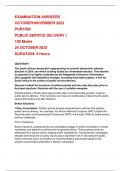Exam (elaborations)
PUB1508 EXAMINATION 23 OCTOBER 2023 Quality answers
- Course
- Institution
ANSWER ALL THE QUESTIONS QUESTION 1 The South African electorate is approaching its seventh democratic national election in 2024, one which is being touted as a watershed election. This election is expected to be tightly contested as the Independent Electoral Commission (IEC) grapples with ...
[Show more]



